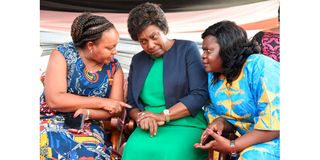How to enhance women’s role in electoral process

Governors Anne Waiguru (Kirinyaga), Charity Ngilu (Kitui) and Homa Bay Woman Rep Gladys Wanga during a public function at Bukhungu Stadium in Kakamega County.
What you need to know:
- The public is socialised from birth to limit women and their effectiveness to domestic settings.
- Parties should conduct research to understand what blocks women’s participation in political spheres.
Women account for 50.31 per cent of Kenya’s population, as per the last census. However, women’s representative seats only account for 23 per cent of membership to the National Assembly and the Senate. This means that out of every four members, three are men. This leadership gap exists for several reasons.
First, the public is socialised from birth to limit women and their effectiveness to domestic settings. Women who are active in politics are depicted as “bad women” for allegedly escaping domestic duty. Subjected to impossible social standards as wives and mothers, women have to foremost meet and surpass these biased standards to be considered worthy of political office.
Family roles are used to attack rather than uplift women, alongside a negative critical focus on their appearance and clothing instead of their leadership abilities. This further marginalises women who are unmarried, divorced and single mothers.
Secondly, women are painted as having sub-par political understanding. They are defined only as assistants, rather than as leaders, thinkers and pioneers in national welfare. Women politicians also tend to be limited to matters considered feminine affairs, such as menstruation, child welfare and girls’ issues. Meanwhile, finance, development, defence and international relations, which not only attract larger budgets but equally affect women’s well-being, are masculinised.
Opinion leaders
Changing this will involve active and sustained social engagement by several stakeholders. The first is opinion leaders whose positions have been used to entrench women’s subordinate positions. The same goes for religious leaders, neighbourhood associations, school boards and other organisations that have benefited from women’s guidance.
They must begin to publicise and amplify their support for women in the political arena as well. The media have enabled the demeaning of women in politics by pitting women against one another to claim they are not united, while nobody subjects male politicians to such negative gender framing. Media must broaden the way they discuss women as political entities by making featuring of more women a norm and not an exception.
Political parties also have a central role to play, beyond candidate platforms to individual high achievers. Membership drives should target women, and parties should create room in high-level work, committees, delegations and working and action groups for women, especially young ones.
Parties should conduct research among members and target audiences to understand what blocks women’s participation in political spheres as candidates and interested stakeholders and work to remove those challenges. This is an excellent time to explore the societal barriers preventing women from being better participants in the leadership structures whose outputs directly affect their daily lives.
The writer is a policy analyst. [email protected]





